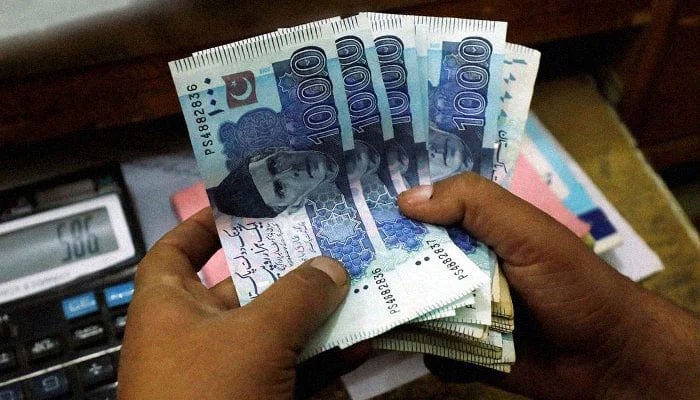Rupee seen under pressure
KARACHI: The rupee would likely lose more ground against the dollar next week in case the central bank refrains from intervening till the completion of the sixth review of the International Monetary Fund (IMF) for $6 billion loan programme, analysts and dealers said.
The rupee continued to suffer from higher demand for dollars from importers, particularly in the absence of inflows from the central bank and other sellers. In addition, wide trade deficit caused by hefty imports and global oil prices were a threat to currency stability.
The rupee closed at a record low of 177.71 to the dollar on Friday. It depreciated by 0.69 percent during the outgoing week.
“There is still some demand pressure and that could let the rupee weaken further, unless there is liquidity intervention in the foreign exchange market. The rupee seems to trade at 178-179 levels in days ahead,” said a currency dealer.
The State Bank of Pakistan’s two important actions: increase in the cash reserves requirement for banks and a big hike in the interest rates last month hasn’t helped slow the domestic demand and inflation, and arrest the rupee’s free fall.
Pakistan and the IMF on November 21 reached a staff level agreement on policies and reforms needed to complete the sixth review under the Extended Fund Facility. The country will secure a $1 billion tranche of the IMF funding once its board approves it was following the implementation of the prior actions, especially on fiscal and institutional reforms. The government is likely to present a mini budget before the Parliament soon to end all exemptions on sales tax to secure the IMF funding approval.
The SBP’s Monetary Policy Committee is due to meet on Tuesday to review the economy and announce the interest rate decision. Analysts and markets expect the SBP to make a 100-150 basis points policy rate hike at its December 14 meeting, as it wants to combat a soaring current account deficit and increasing inflation.
Higher than expected imports in November and December, Temporary Economic Refinance Facility adjustments, repatriation of profits, interest and principal repayments will keep the rupee under pressure, and contribute to imported inflation, according to a client note from Tresmark.
Somehow the equation keeps going back to the IMF, and it becomes more critical every week for Pakistan’s economic stability.
Unfortunately, in a poll conducted by Tresmark, 21 percent responded that IMF loan resumption was ‘unlikely’, going up from 9 percent a week ago when staff level agreement was reported. “This change could be because of Pakistan’s recent stance on US’ ‘Democracy Summit’ and FO’s (Foreign Office) criticism of US for boycotting Beijing Olympics,” it said.
It is hoped that based on Pakistan’s current vulnerability, Covid resurgence and the Afghanistan effect, saner minds will prevail, it added.
So Pakistan will have to proactively manage the situation for the next 30 days till we hear from the IMF again, without letting the situation deteriorate to such an extent that pulling back becomes a challenge, it said.
“Based on this, we expect more policy interventions (and not rely only on rate hikes) by the SBP, administrative measures to control prices by the government and verbal interventions by both to rein in volatility.”
-
 King Charles Lands In The Line Of Fire Because Of Andrew Mountbatten-Windsor
King Charles Lands In The Line Of Fire Because Of Andrew Mountbatten-Windsor -
 Denise Richards Doubles Down On Abuse Claims Against Ex Husband Aaron Phypers Amid Show Return
Denise Richards Doubles Down On Abuse Claims Against Ex Husband Aaron Phypers Amid Show Return -
 Russia Set To Block Overseas Crypto Exchanges In Sweeping Crackdown
Russia Set To Block Overseas Crypto Exchanges In Sweeping Crackdown -
 Gwyneth Paltrow Reveals Deep Personal Connection With Kate Hudson
Gwyneth Paltrow Reveals Deep Personal Connection With Kate Hudson -
 Prince Harry, Meghan Markle’s Game Plan For Beatrice, Eugenie: ‘Extra Popcorn For This Disaster’
Prince Harry, Meghan Markle’s Game Plan For Beatrice, Eugenie: ‘Extra Popcorn For This Disaster’ -
 OpenAI To Rollout AI Powered Smart Speakers By 2027
OpenAI To Rollout AI Powered Smart Speakers By 2027 -
 Is Dakota Johnsons Dating Younger Pop Star After Breakup With Coldplay Frontman Chris Martin?
Is Dakota Johnsons Dating Younger Pop Star After Breakup With Coldplay Frontman Chris Martin? -
 Hilary Duff Tears Up Talking About Estranged Sister Haylie Duff
Hilary Duff Tears Up Talking About Estranged Sister Haylie Duff -
 US Supreme Court Strikes Down Trump’s Global Tariffs As 'unlawful'
US Supreme Court Strikes Down Trump’s Global Tariffs As 'unlawful' -
 Kelly Clarkson Explains Decision To Quit 'The Kelly Clarkson Show'
Kelly Clarkson Explains Decision To Quit 'The Kelly Clarkson Show' -
 Inside Hilary Duff's Supportive Marriage With Husband Matthew Koma Amid New Album Release
Inside Hilary Duff's Supportive Marriage With Husband Matthew Koma Amid New Album Release -
 Daniel Radcliffe Admits To Being Self Conscious While Filming 'Harry Potter' In Late Teens
Daniel Radcliffe Admits To Being Self Conscious While Filming 'Harry Potter' In Late Teens -
 Director Beth De Araujo Alludes To Andrew's Arrest During Child Trauma Talk
Director Beth De Araujo Alludes To Andrew's Arrest During Child Trauma Talk -
 'Harry Potter' Alum Daniel Radcliffe Gushes About Unique Work Ethic Of Late Co Star Michael Gambon
'Harry Potter' Alum Daniel Radcliffe Gushes About Unique Work Ethic Of Late Co Star Michael Gambon -
 Video Of Andrew 'consoling' Eugenie Resurfaces After Release From Police Custody
Video Of Andrew 'consoling' Eugenie Resurfaces After Release From Police Custody -
 Japan: PM Takaichi Flags China ‘Coercion,’ Pledges Defence Security Overhaul
Japan: PM Takaichi Flags China ‘Coercion,’ Pledges Defence Security Overhaul




